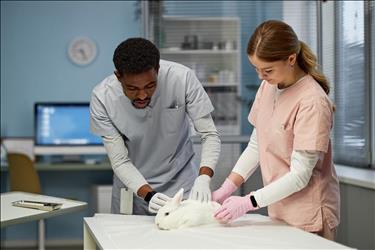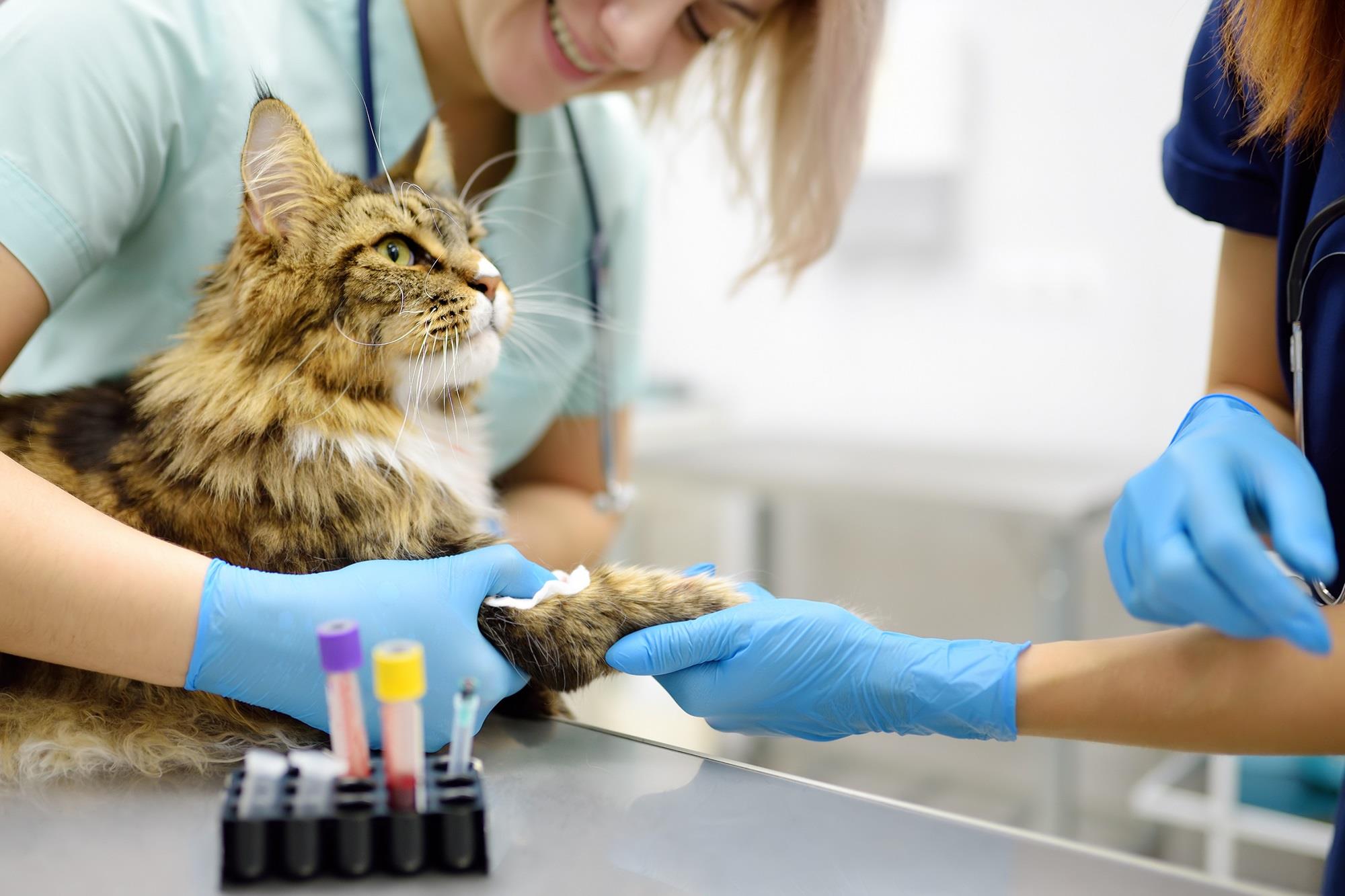- Job Seeker Resources
- |
- Last Updated: October 13, 2025

Vet Tech vs. Vet Assistant: What’s the Difference?
When you take your pet for a check-up, you interact with a team of dedicated professionals. While the veterinarian leads the diagnosis and treatment, other key players ensure the clinic runs smoothly and your furry friend receives the best possible care. Two of these critical roles are the veterinary technician and the veterinary assistant.
Though their titles sound similar, these two careers are distinct in their responsibilities, educational requirements, and scope of practice. Understanding the difference between a vet tech and a vet assistant is essential, whether you’re a pet owner wanting to know who is caring for your animal or someone considering a career in veterinary medicine.
This guide will break down the roles, training, and career paths for both veterinary technicians and veterinary assistants to help you navigate your next career step.
What Is a Veterinary Technician?
A veterinary technician (vet tech) is a credentialed professional who acts as a skilled nurse for animals. They are the veterinarian’s right-hand person, performing many of the complex medical tasks necessary for diagnosis and treatment. Think of them as the equivalent of a registered nurse in human medicine. Their advanced training allows them to handle a wide range of clinical duties under the supervision of a licensed veterinarian.
Education and Training
To become a veterinary technician, you must complete a two- or four-year degree program accredited by the American Veterinary Medical Association (AVMA).
- Associate of Applied Science (AAS) in Veterinary Technology: This is the most common path and typically takes two years to complete.
- Bachelor of Science (BS) in Veterinary Technology: A four-year degree that can open doors to advanced opportunities in research, management, or specialty practices.
After graduation, you must pass the Veterinary Technician National Examination (VTNE) to become credentialed. Depending on the state, you may be known as a Registered Veterinary Technician (RVT), a Licensed Veterinary Technician (LVT), or a Certified Veterinary Technician (CVT). Continuing education is also required to maintain this license.
What Do Vet Techs Do?
The responsibilities of a vet tech are hands-on and highly clinical. They are directly involved in patient care and medical procedures. Daily tasks often include:
- Administering anesthesia and monitoring patients during surgery
- Performing dental cleanings and procedures
- Taking X-rays and other diagnostic images
- Collecting and analyzing lab samples (blood, urine, tissue)
- Placing catheters and administering medications
- Assisting the veterinarian in surgery
- Providing emergency care and first aid
- Educating pet owners on post-operative care, nutrition, and medication
A high level of technical skill, a strong understanding of animal anatomy and physiology, and the ability to remain calm under pressure are essential for success in this role. The average veterinary technician salary reflects this advanced training and responsibility.

What Is a Veterinary Assistant?
A veterinary assistant is a vital support member of the veterinary team. They handle a wide range of tasks that ensure the clinic operates efficiently and that both the vet and vet tech can focus on their clinical duties. Their work is crucial for maintaining a safe, clean, and organized environment for patients and staff.
Education and Training
The path to becoming a veterinary assistant is more flexible. While some assistants receive on-the-job training, many employers now prefer candidates who have completed a formal training program.
- On-the-Job Training: Some clinics hire assistants with a high school diploma and a passion for animals, providing training in-house.
- Veterinary Assistant Programs: Many vocational schools and community colleges offer certificate programs that take several months to a year to complete. These vet assistant programs cover animal handling, basic medical terminology, and administrative duties.
Unlike vet techs, assistants are not required to be licensed, though voluntary certification is available through organizations like the National Association of Veterinary Technicians in America (NAVTA).
Explore Veterinary Jobs Today
Create your free account to get started!

Job Seeker Sign In
We Value Your Privacy
Veterinary Assistant Responsibilities
A veterinary assistant’s duties are focused on supporting the clinical team and managing the practice environment. Key responsibilities include:
- Safely restraining and handling animals for examinations and procedures
- Feeding, watering, and walking boarding or hospitalized animals
- Cleaning and sterilizing cages, surgical suites, and equipment
- Assisting with administrative tasks like scheduling appointments and managing records
- Preparing examination rooms for patients
- Providing basic grooming services like nail trims and baths
- Observing and reporting on animal behavior and condition to the vet tech or veterinarian
Strong communication skills, physical stamina, and a deep sense of compassion are fundamental for anyone looking at vet assistant jobs.
Key Differences: Vet Tech vs. Vet Assistant
While both roles are essential, they differ significantly in training, responsibility, and autonomy.
| Veterinary Technician | Veterinary Assistant | |
| Education | 2- or 4-year AVMA-accredited degree | High school diploma or certificate program |
| Credentials | Must pass the VTNE and be licensed (LVT, RVT, CVT) | No license required; optional certification |
| Scope of Practice | Performs complex clinical tasks (anesthesia, lab work, dental procedures) | Supports the team with animal handling, cleaning, and administrative tasks |
| Autonomy | Higher level of autonomy under veterinarian supervision | Works under the direct supervision of a vet or vet tech |
| Salary | Higher salary due to advanced education and skills | Lower salary reflecting less stringent educational requirements |
The most significant difference between a vet tech and a vet assistant lies in the scope of practice. A vet tech is trained and licensed to perform medical procedures. An assistant, while indispensable, supports these procedures but does not perform them.
Shared Purpose in Veterinary Care
Despite their differences, veterinary technicians and assistants share a common ground: a profound dedication to animal welfare. Both roles require a love for animals and a commitment to providing them with compassionate, high-quality care. They work side-by-side every day, contributing to the health and happiness of their patients and the overall success of the practice.
Your Path to an Animal Care Career
Both veterinary technicians and veterinary assistants play irreplaceable roles in the world of animal healthcare. Understanding the distinct responsibilities and requirements of each career is the first step toward finding your place on a veterinary team.
If you are drawn to the medical and scientific aspects of animal care and are ready to pursue a college degree, a career as a veterinary technician could be your calling. If you are eager to get started in the field quickly and excel at supporting a team, becoming a veterinary assistant is a fantastic way to begin your journey.
No matter which path you choose, a fulfilling career awaits. Explore vet tech and vet assistant jobs near you on iHireVeterinary to take the next step.
Sign In or Register to access all articles and insider tips for help in your job search.
Search for iHire Jobs
RELATED JOBS
Registered Veterinary Technician Salary: $22-$26/hr. Schedule: Monday- Friday 8:00-6:00pm,...
Veterinary Assistant- MaxtownVeterinary Assistant WestVets Maxtown Veterinary Clinic is hiring a part-time Vet Assistant to...
Veterinary Care Technician 2 Farm AnimalScreen reader users may encounter difficulty with this site. For assistance with applying,...
Kennel SupervisorGo to The primary purpose of the Kennel Attendant Foreman classification is to supervise the...
Veterinary AssistantLocation: 6868 Caine Rd, Columbus, OH 43235 Join Our Amazing Team at VCA Sawmill Animal...
RELATED RESOURCES
Find the Right Job Faster
- Get personalized job matches sent to your inbox every day
- Connect directly with employers before your competition
- Advance your career with expert advice on interviewing, salary negotiation, and more
We value your privacy




